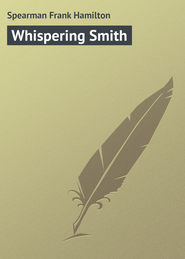По всем вопросам обращайтесь на: info@litportal.ru
(©) 2003-2024.
✖
Held for Orders: Being Stories of Railroad Life
Настройки чтения
Размер шрифта
Высота строк
Поля
But the roundhouse – for a boy like Bullhead. It would hardly do. He was put at helping Pete Beezer, the boiler washer. One night Pete was snatching his customary nap in the pit when the hose got away from Bullhead and struck his boss. In the confusion, Peter, who was nearly drowned, lost a set of teeth; that was sufficient in that department of the motive power; Bullhead moved on, suddenly. Neighbor thought he might do for a wiper. After the boy had learned something about wiping he tried one day to back an engine out on the turn-table just to see whether it was easy. It was; dead easy; but the turn-table happened to be arranged wrong for the experiment; and Neighbor, before calling in the wrecking gang, took occasion to kick Bullhead out of the roundhouse bodily.
Nevertheless, Bullhead, like every Medicine Bend boy, wanted to railroad. Some fellows can't be shut off. He was offered the presidency of a Cincinnati bank by a private detective agency which had just sent up the active head of the institution for ten years; but as Bullhead could not arrange transportation east of the river he was obliged to let the opportunity pass.
When the widow Lyons asked Callahan to put Jamie at telegraphing the assistant superintendent nearly fell off his chair. Mrs. Lyons, however, was in earnest, as the red-haired man soon found by the way his shirts were starched. Her son, meantime, had gotten hold of a sounder, and was studying telegraphy, corresponding at the same time with the Cincinnati detective agency for the town and county rights to all "hidden and undiscovered crime," on the Mountain Division – rights offered at the very reasonable price of ten dollars by registered mail, bank draft or express money order; currency at sender's risk. The only obligations imposed by this deal were secrecy and a German silver star; and Bullhead, after holding his trusting mother up for the ten, became a regularly installed detective with proprietary rights to local misdeeds. Days he plied his sounder, and nights he lay awake trying to mix up Pete Beezer and Neighbor with the disappearance of various bunches of horses from the Bar M ranch.
About the same time he became interested in dentistry; not that there is any obvious connection between railroading and detective work and filling teeth – but his thoughts just turned that way and following the advice of a local dentist, who didn't want altogether to discourage him, Bullhead borrowed a pair of forceps and pulled all the teeth out of a circular saw to get his arm into practice. Before the dentist pronounced him proficient, though, his mother had Callahan reduced to terms, and the assistant superintendent put Bullhead among the operators.
That was a great day for Bullhead. He had to take the worst of it, of course; sweeping the office and that; but whatever his faults, the boy did as he was told. Only one vicious habit clung to him – he had a passion for reading the rules. In spite of this, however, he steadily mastered the taking, and, as for sending, he could do that before he got out of the cuspidor department. Everybody around the Wickiup bullied him, and maybe that was his salvation. He got used to expecting the worst of it, and nerved himself to take it, which in railroading is half the battle.
A few months after he became competent to handle a key the nightman at Goose River Junction went wrong. When Callahan told Bullhead he thought about giving him the job, the boy went wild with excitement, and in a burst of confidence showed Callahan his star. It was the best thing that ever happened, for the assistant head of the division had an impulsive way of swearing the nonsense out of a boy's head, and when Bullhead confessed to being a detective a fiery stream was poured on him. The foolishness couldn't quite all be driven out in one round; but Jamie Lyons went to Goose River fairly well informed as to how much of a fool he was.
Goose River Junction is not a lively place. It has been claimed that even the buzzards at Goose River Junction play solitaire. But apart from the utter loneliness it was hard to hold operators there on account of Nellie Cassidy. A man rarely stayed at Goose River past the second pay-check. When he got money enough to resign he resigned; and all because Nellie Cassidy despised operators.
The lunch counter that Matt Cassidy, Nellie's father, ran at the Junction was just an adjunct for feeding train crews and the few miners who wandered down from the Glencoe spur. Matt himself took the night turn, but days it was Nellie who heated the Goose River coffee and dispensed the pie – contract pie made at Medicine Bend, and sent by local freight classified as ammunition, loaded and released, O. R.
It was Nellie's cruelty that made the frequent shifts at Goose River. Not that she was unimpressible, or had no heroes. She had plenty of them in the engine and the train service. It was the smart-uniformed young conductors and the kerchiefed juvenile engineers on the fast runs to whom Nellie paid deference, and for whom she served the preferred doughnuts.
But this was nothing to Bullhead. He had his head so full of things when he took his new position that he failed to observe Nellie's contempt. He was just passing out of the private detective stage; just getting over dental beginnings; just rising to the responsibility of the key, and a month devoted to his immediate work and the study of the rules passed like a limited train. Previous to the coming of Bullhead, no Goose River man had tried study of the rules as a remedy for loneliness; it proved a great scheme; but it aroused the unmeasured contempt of Nellie Cassidy. She scorned Bullhead unspeakably, and her only uneasiness was that he seemed unconscious of it.
However, the little Goose River girl had no idea of letting him escape that way. When scorn became clearly useless she tried cajolery – she smiled on Bullhead. Not till then did he give up; her smile was his undoing. It was so absolutely novel to Bullhead – Bullhead, who had never got anything but kicks and curses and frowns. Before Nellie's smiles, judiciously administered, Bullhead melted like the sugar she began to sprinkle in his coffee. That was what she wanted; when he was fairly dissolved, Nellie like the coffee went gradually cold. Bullhead became miserable, and to her life at Goose River was once more endurable.
It was then that Bullhead began to sit up all day, after working all night, to get a single smile from the direction of the pie rack. He hung, utterly miserable, around the lunch room all day, while Nellie made impersonal remarks about the colorless life of a mere operator as compared with life in the cab of a ten-wheeler. She admired the engineer, Nellie – was there ever a doughnut girl who didn't? And when One or Two rose smoking out of the alkali east or the alkali west, and the mogul engine checked its gray string of sleepers at the Junction platform, and Bat Mullen climbed down to oil 'round – as he always did – there were the liveliest kind of heels behind the counter.
Such were the moments when Bullhead sat in the lunch room, unnoticed, somewhat back where the flies were bad, and helped himself aimlessly to the sizzling maple syrup – Nellie rustling back and forth for Engineer Mullen, who ran in for a quick cup, and consulted, after each swallow, a dazzling open-faced gold watch, thin as a double eagle; for Bat at twenty-one was pulling the fast trains and carried the best. And with Bullhead feeding on flannel cakes and despair, and Nellie Cassidy looking quite her smartest, Mullen would drink his coffee in an impassive rush, never even glancing Bullhead's way – absolutely ignoring Bullhead. What was he but a nightman, anyway? Then Mullen would take as much as a minute of his running time to walk forward to the engine with Miss Cassidy, and stand in the lee of the drivers chatting with her, while Bullhead went completely frantic.
It was being ignored in that way, after her smiles had once been his, that crushed the night operator. It filled his head with schemes for obtaining recognition at all hazards. He began by quarrelling violently with Nellie, and things were coming to a serious pass around the depot when the Klondike business struck the Mountain Division. It came with a rush and when they began running through freight extras by way of the Goose River short line, day and night, the Junction station caught the thick of it. It was something new altogether for the short line rails and the short line operators, and Bullhead's night trick, with nothing to do but poke the fire and pop at coyotes, became straightway a busy and important post. The added work kept him jumping from sundown till dawn, and kept him from loafing daytimes around the lunch counter and ruining himself on fermented syrup.
On a certain night, windier than all the November nights that had gone before, the night operator sat alone in the office facing a resolve. Goose River had become intolerable. Medicine Bend was not to be thought of, for Bullhead now had a suspicion, due to Callahan, that he was a good deal of a chump, and he wanted to get away from the ridicule that had always and everywhere made life a burden. There appeared to Bullhead nothing for it but the Klondike. On the table before the moody operator lay his letter of resignation, addressed in due form to J. S. Bucks, superintendent. Near it, under the lamp, lay a well-thumbed copy of the book of rules, open at the chapter on Resignations, with subheads on —
Resign, who should.
Resign, how to.
Resign, when to. (See also Time.)
The fact was it had at last painfully forced itself on Bullhead that he was not fitted for the railroad business. Pat Francis had unfeelingly told him so. Callahan had told him so; Neighbor had told him so; Bucks had told him so. On that point the leading West End authorities were agreed. Yet in spite of these discouragements he had persisted and at last made a show. Who was it now that had shaken his stubborn conviction? Bullhead hardly dared confess. But it was undoubtedly one who put up to be no authority whatever on Motive Power or Train Service or Operating – it was Matt Cassidy's girl.
While he re-read his formal letter and compared on spelling with his pocket Webster, a train whistled. Bullhead looked at the clock: 11.40 P. M. It was the local freight, Thirty, coming in from the West, working back to Medicine. From the East, Number One had not arrived; she was six hours late, and Bullhead looked out at his light, for he had orders for the freight. It was not often that such a thing happened, because One rarely went off schedule badly enough to throw her into his turn. He had his orders copied and O.K.'d, and waited only to deliver them.
It was fearfully windy. The 266 engine, pulling Thirty that night, wheezed in the gale like a man with the apoplexy. She had a new fireman on, who was burning the life out of her, and as she puffed painfully down on the scrap rails of the first siding and took the Y, her overloaded safety gasped violently.
When the conductor of the Number Thirty train opened the station door, the wind followed him like a catamount. The stove puffed open with a down draft, and shot the room full of stinging smoke. The lamp blaze flew up the chimney – out – and left the nightman and the conductor in darkness. The trainman with a swear shoved-to the door, and Bullhead, the patient, turned over his letter of resignation quick in the dark, felt for a match and relighted his lamp. Swearing again at Bullhead, the freight conductor swaggered over to his table, felt in all the operator's pockets for a cigar, tumbled all the papers around, and once more, on general principles, swore.
Bullhead took things uncomplainingly, but he watched close, and was determined to fight if the brute discovered his letter of resignation. When the trainman could think of no further indignities he took his orders, to meet Number One at Sackley, the second station east of Goose River. After he had signed, Bullhead asked him about the depot fire at Bear Dance that had been going over the wires for two hours, reminded him of the slow order for the number nine culvert and as the rude visitor slammed the door behind him, held his hand over the lamp. Then he sat down again and turned over his letter of resignation.
To make it binding it lacked only his signature – James Gillespie Blaine Lyons – now, himself, of the opinion of every one else on the West End: that he was just a natural born blooming fool. He lifted his pen to sign off the aspirations of a young lifetime when the sounder began to snap and sputter his call. It was the despatcher, and he asked hurriedly if Number Thirty was there.
"Number Thirty is on the Y," answered Bullhead.
Then came a train order. "Hold Number Thirty till Number One arrives."
Bullhead repeated the order, and got back the O. K. He grabbed his hat and hurried out of the door to deliver the new order to the local freight before it should pull out.
To reach the train Bullhead had to cross the short line tracks. The wind was scouring the flats, and as he tacked up the platform the dust swept dead into him. At the switch he sprang across the rails, thinking of nothing but reaching the engine cab of the local – forgetting about the track he was crossing. Before he could think or see or jump, a through freight on the short line, wild, from the West, storming down the grade behind him, struck Bullhead as a grizzly would a gnat – hurled him, doubling, fifty feet out on the spur – and stormed on into the East without a quiver out of the ordinary. One fatality followed another. The engineer of the short line train did not see the man he had hit, and with the nightman lying unconscious in the ditch, the local freight pulled out for Sackley.
Bullhead never knew just how long he lay under the stars. When his head began to whirl the wind was blowing cool and strong on him, and the alkali dust was eddying into his open mouth. It was only a matter of seconds, though it seemed hours, to pull himself together and to put up his hand unsteadily to feel what it was soaking warm and sticky into his hair; then to realize that he had been struck by a short line train; to think of what a failure he had lately acknowledged himself to be; and of what it was he was clutching so tightly in his right hand – the holding order for Number Thirty. He raised his reeling head; there was a drift of starlight through the dust cloud, but no train in sight; Number Thirty was gone. With that consciousness came a recollection – he had forgotten to put out his red light.
His red light wasn't out. He kept repeating that to himself to put the picture of what it meant before him. He had started to deliver an order without putting out his light, and Number Thirty was gone; against Number One – a head end collision staring the freight and the belated passenger in the face. Number Thirty, running hard on her order to make Sackley for the meeting, and One, running furiously, as she always ran – to-night worse than ever.
He lifted his head, enraged with himself; enraged. He thought about the rules, and he grew enraged. Only himself he blamed, nobody else – studying the rules for a lifetime and just when it would mean the death of a trainload of people forgetting his red signal. He lifted his head; it was sick, deadly sick. But up it must come, Thirty gone, and it wabbled, swooning sick and groggy as he stared around and tried to locate himself. One thing he could see, the faint outline of the station and his lamp blazing smoky in the window. Bullhead figured a second; then he began to crawl. If he could reach the lamp before his head went off again, before he went completely silly, he might yet save himself and Number One.
It wasn't in him to crawl till he thought of his own mistake; but there was a spur in the sweep of that through his head. His brain, he knew, was wabbling, but he could crawl; and he stuck fainting to that one idea, and crawled for the light of his lamp.
It is a bare hundred feet across to the Y. Bullhead taped every foot of the hundred with blood. There was no one to call on for help; he just stuck to the crawl, grinding his teeth in bitter self-reproach. They traced him, next morning when he was past the telling of it, and his struggle looked the track of a wounded bear. Dragging along one crushed leg and half crazed by the crack on his forehead, Bullhead climbed to the platform, across, and dragged himself to the door. He can tell yet about rolling his broken leg under him and raising himself to grasp the thumb latch. Not until he tried to open it did he remember it was a spring lock and that he was outside. He felt in his pocket for his keys – but his keys were gone.
There were no rules to consult then. No way on earth of getting into the office in time to do anything; to drag himself to the lunch room, twice further than the station, was out of the question. But there was a way to reach his key in spite of all bad things, and Bullhead knew the way. He struggled fast around to the window. Raising himself with a frightful twinge on one knee, he beat at the glass with his fist. Clutching the sash, he drew himself up with a hand, and with the other tore away the muntin, stuck his head and shoulders through the opening, got his hand on the key, and called the first station east, Blaisdell, with the 19. Life and death that call meant; the 19, the despatcher's call – hanging over the key, stammering the 19 over the wire, and baptizing the call in his own blood – that is the way Bullhead learned to be a railroad man.
For Blaisdell got him and his warning, and had Number One on the siding just as the freight tore around the west curve, headed for Sackley. While it was all going on, Bullhead lay on the wind-swept platform at Goose River with a hole in his head that would have killed anybody on the West End, or, for that matter on earth except James Gillespie Blaine Lyons.
After Number Thirty had passed so impudently, Number One felt her way rather cautiously to Goose River, because the despatchers couldn't get the blamed station. They decided, of course, that Bullhead was asleep, and fixed everything at the Wickiup to send a new man up there on Three in the morning and fire him for good.
But about one o'clock Number One rolled, bad-tempered, into Goose River Junction, and Bat Mullen, stopping his train, strode angrily to the station. It was dark as a pocket inside. Bat smashed in the door with his heel, and the trainmen swarmed in and began looking with their lanterns for the nightman. The stove was red-hot, but he was not asleep in the arm-chair, nor napping under the counter on the supplies. They turned to his table and discovered the broken window, and thought of a hold-up. They saw where the nightman had spilled something that looked like ink over the table, over the order book, over the clip, and there was a hand print that looked inky on an open letter addressed to the superintendent – and a little pool of something like ink under the key.
Somebody said suicide; but Bat Mullen suddenly stuck his lamp out of the broken window, put his head through after it, and cried out. Setting his lantern down on the platform, he crawled through the broken sash and picked up Bullhead.
Next morning it was all over the West End.
"And Bullhead!" cried everybody. "That's what gets me. Who'd have thought it of Bullhead!"
When they all got up there and saw what Bullhead had done, everybody agreed that nobody but Bullhead could have done it.
The pilot bar of the short line mogul, in swiping Bullhead unmercifully, had really made a railroad man of him. It had let a great light in on the situation. Whereas before every one else on the line had been to blame for his failures, Bullhead now saw that he himself had been to blame, and was man enough to stand up and say so. When the big fellows, Callahan and Kenyon and Pat Francis, saw his trail next morning, saw the blood smeared over the table, and saw Bullhead's letter of resignation signed in his own blood manual, and heard his straight-out story days afterward, they said never a word.
But that morning, the morning after, Callahan picked up the letter and put it just as it was between the leaves of the order book and locked both in his grip. It was some weeks before he had a talk with Bullhead, and he spoke then only a few words, because the nightman fainted before he got through. Callahan made him understand, though, that as soon as he was able he could have any key on that division he wanted as long as he was running it – and Callahan is running that division yet.
It all came easy after he got well. Instead of getting the worst of it from everybody, Bullhead began to get the best of it, even from pretty Nellie Cassidy. But Nellie had missed her opening. She tried tenderness while the boy was being nursed at the Junction. Bullhead looked grim and far-off through his bulging bandages, and asked his mother to put the sugar in his coffee for him; Bullhead was getting sense.
Besides, what need has a young man with a heavy crescent-shaped scar on his forehead, that people inquire about and who within a year after the Goose River affair was made a train despatcher under Barnes Tracy at Medicine Bend – what need has he of a coquette's smiles? His mother, who has honorably retired from hard work, says half the girls at the Bend are after him, and his mother ought to know, for she keeps house for him.
Bullhead's letter of resignation with the print of his hand on it hangs framed over Callahan's desk, and is shown to railroad big fellows who are accorded the courtesies of the Wickiup. But when they ask Bullhead about it, he just laughs and says some railroad men have to have sense pounded into them.
The Master Mechanic's Story
DELAROO
"You tell it. I can't tell it," growled Neighbor.
"Oh, no. No. That's your story, Neighbor."










